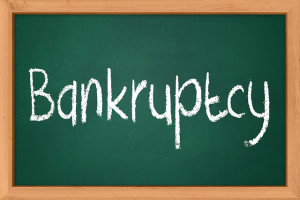The question of how long a Chapter 7 bankruptcy stays on your credit report is one I get all the time. The short answer is 10 years. But the real reason that people ask me this question is because they’ve heard that a bankruptcy, especially a Chapter 7 bankruptcy, destroys the credit report for as long as it appears on their credit report, or even permanently. However, this reflects a couple of fundamental misunderstandings about the impact of bankruptcy on your credit report.
Myth #1: Chapter 7 Bankruptcy Destroys Your Credit
Simply put, it isn’t true that Chapter 7 bankruptcy, or any chapter of bankruptcy, destroys your credit. Your credit score takes an initial hit of several points as a result of the Chapter 7 being filed. But in saying that a Chapter 7 “destroys your credit,” you are giving too much power to bankruptcy – even more power than your bad debts have. It’s not possible for bankruptcy to “destroy” your credit report. What does it even mean for something to destroy your credit?
Let’s examine this belief: Does it mean that, when you apply for credit after bankruptcy, the decision maker will see that you filed for bankruptcy and automatically deny you? That’s just not true, but let’s assume for a moment that it is, and work through it logically.
Let’s start with basic facts: You have unmanageable credit card debt. Either all of that credit card debt shows up on your credit report, or it doesn’t because it’s business debt or because it’s pretty old. If it shows up, your credit report already looks bad because your debt-to-income ratio is bad and/or one or more accounts shows as being in default. But whether the debt appears on your credit report or not, you are living under the threat of debt collection, which includes debt-collection lawsuits. If you get sued for a debt and get a judgment against you, you could be subject to bank levy and/or wage garnishment. That’s even worse for your income and credit; it deprives you of full control over your income and your bank account.
Let’s say that instead of keeping these unmanageable debts on your credit report, instead of subjecting yourself to debt-collection lawsuits, you qualify and file for a Chapter 7 bankruptcy and you get all those credit-card debts discharged. How does your credit report look then? Yes, the bankruptcy shows up. Yes, all your credit-card accounts show up…but NOT as owing any balances. Instead, they show up as “$0 owed, discharged in bankruptcy” or something similar.
How does the sudden lack of debt affect your credit report? Positively, to be sure. Your debt-to-income ratio, which looked pretty bad just a few months before, looks a lot better after all that debt is wiped out in bankruptcy. Any creditor, such as a mortgage company, who is interested in how much debt you’re carrying, will see that you have several $0 balances, instead of credit-card balances totaling $20,000, $30,000 or more. Owing $0 gives you more money to put toward other things, such as a new mortgage, than owing $30,000 or more on credit cards. Mortgage companies know this.
Yes, there’s a waiting period of a couple years after bankruptcy before you can qualify for a mortgage, but that waiting period is shorter than the amount of time that bad (defaulted) credit-card debt stays on your credit report. Bad debt generally stays on your credit for 7 1/2 years. Which one do you think looks “better”? Seven and a half years of owing a ton of unmanageable credit card debt, or a Chapter 7 bankruptcy notation with no credit card debt at all? If you said the former, then you really need to put yourself in the shoes of creditors and re-examine your financial belief system.
Myth #2: Chapter 7 Bankruptcy Looks Worse on Your Credit Than Chapter 13 Bankruptcy
The basis of the myth that Chapter 13 bankruptcy looks better on your credit report than Chapter 7 bankruptcy comes from the idea that it is better to repay your debts, even partially, and Chapter 13 allows you to do that.
While it’s true that any individual creditor could choose to look more favorably on Chapter 13 for this reason, it’s a myth to believe that a Chapter 13 is always better for your credit. In fact, a Chapter 7 bankruptcy can be better for your credit in that it ends more quickly. To be successful, a Chapter 13 bankruptcy must last either 3 years or 5 years, which is the length of your plan. For each month of your Chapter 13 plan, you pay 100% of your disposable monthly income into the plan.
Either chapter of bankruptcy may be used as a method of solving your debt problems. It’s helpful to keep that in mind: Bankruptcy is a solution, not a way of making your debt problems worse. Don’t let the myths override your ability to rationally think about your financial situation.
For help rationally thinking about solutions to your debt problems, call (201) 676-0722 to schedule a specific day and time to have a discussion with attorney Jennifer Weil, or email weilattorney@gmail.com.


